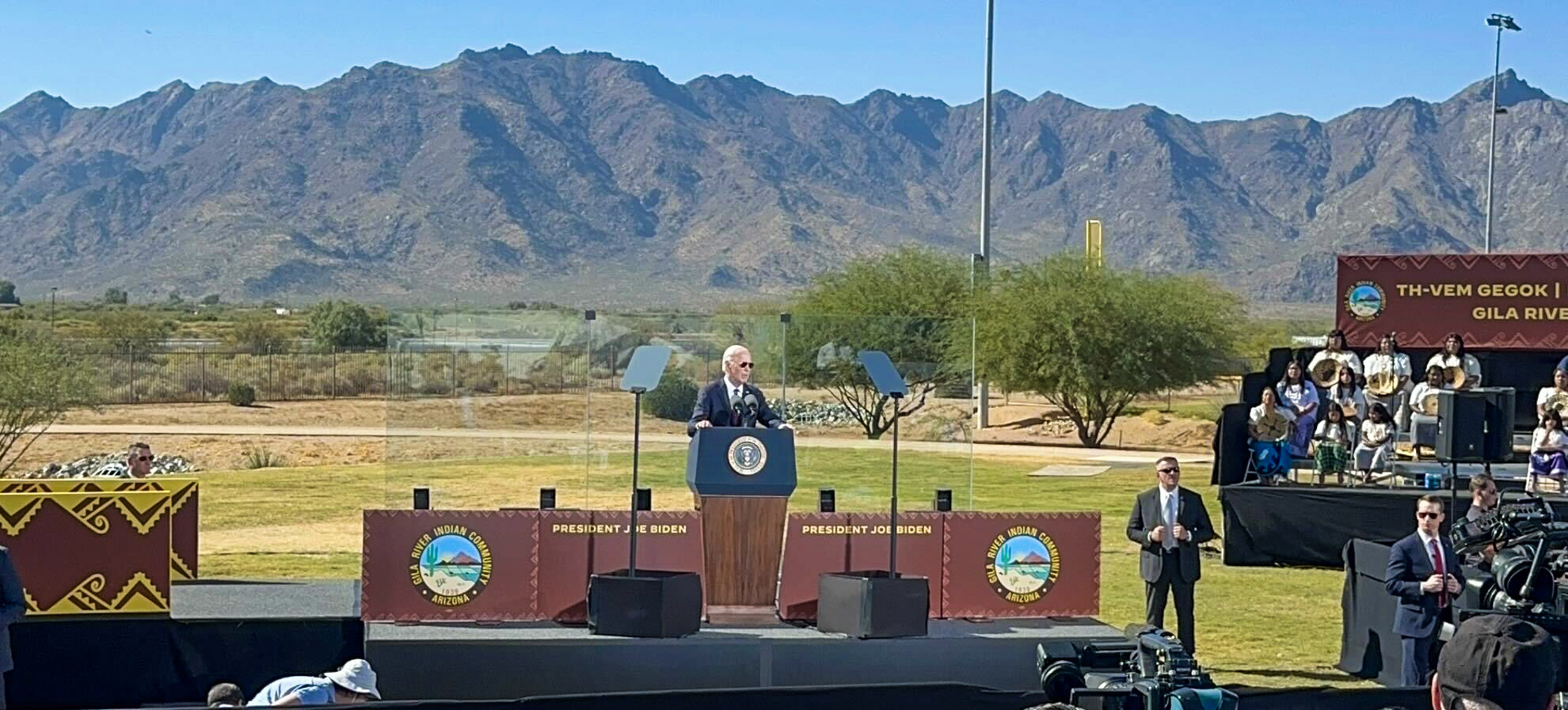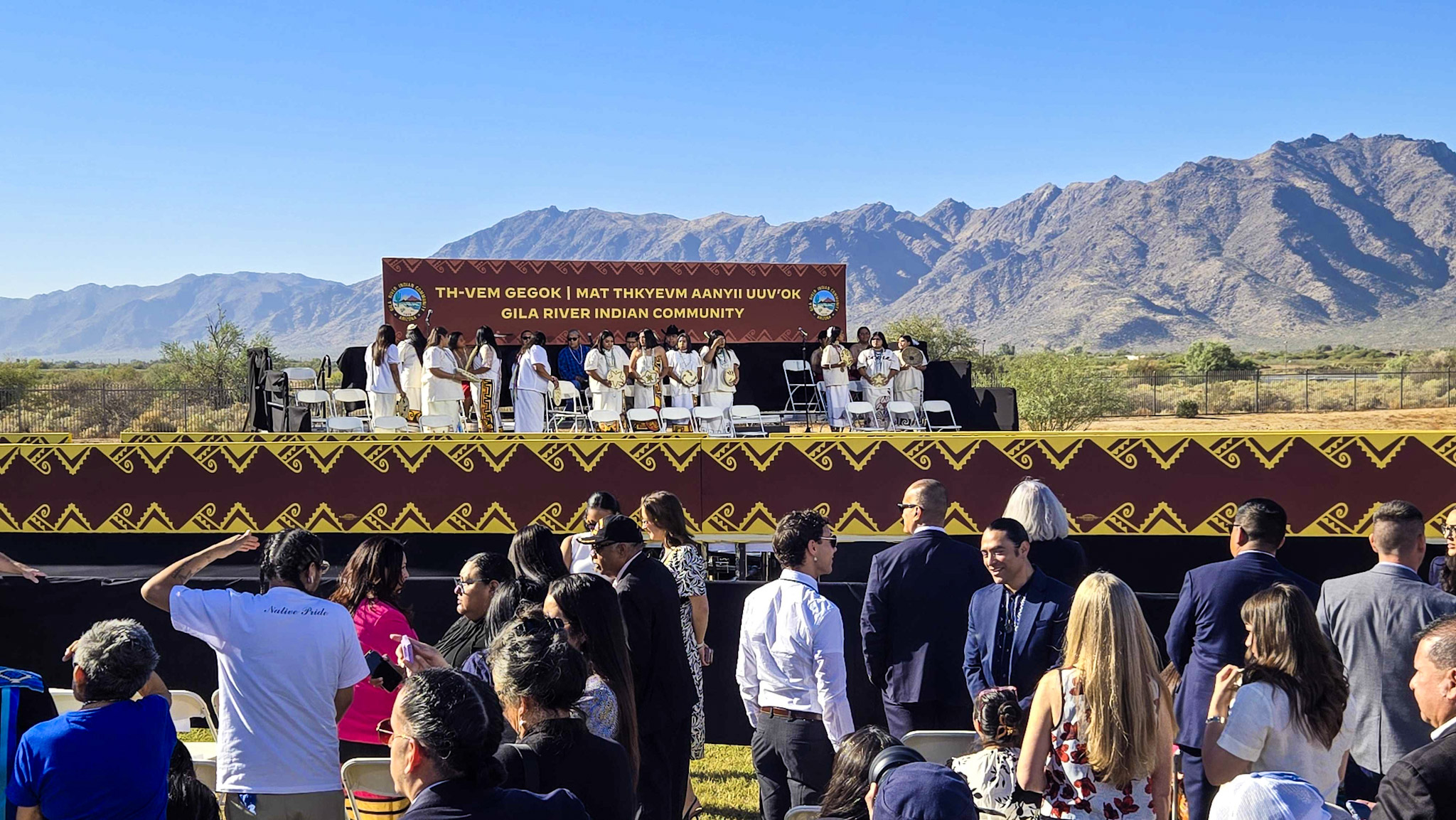LAVEEN VILLAGE, Arizona — President Joe Biden on Friday formally apologized for the 150 years of abuse and harm suffered by Indigenous children that were put into the federal boarding school system.
“I believe it is important that we do know there was generations of Native children stolen, taken away to places they didn’t know, with people they never met, who spoke a language they never heard,” Biden said during a visit to the Gila River Indian Community in front of an emotional crowd. “The federal government has never formally apologized, until today.”
This apology comes after an extensive investigation by the Department of Interior. The Federal Indian Boarding School Initiative began in 2021 and was designed to recognize the long-term impacts of Indian boarding schools from 1819 to 1970.

Indian boarding schools were created to assimilate American Indian, Alaskan Native and Hawaiian Native children to American culture. Children were often forcibly removed from their homes and taken to religious government-funded schools, mainly Protestant and Catholic, hundreds of miles away.
Arizona was home to 59 boarding schools, followed closely by New Mexico with 52, according to the National Native American Boarding School Healing Coalition.
The schools estranged the children from their native culture and traditions, punishing them for speaking their native language. Children suffered mental and physical abuse during their time in the schools, including beatings, starvation and child labor.
Thousands of children are estimated to have died. Many of the deceased are still to be identified.
In Volume II of the investigative report of the Federal Indian Boarding School Initiative, the DOI states it identified 973 student deaths. The actual number is estimated to be much higher.
“The Department acknowledges that the actual number of children who died while in Indian boarding schools is greater,” the report stated.
Secretary of the Interior Deb Haaland, the first Native American cabinet secretary, announced the Federal Indian Boarding School Initiative, which included an investigative report detailing institutions involved in the Indian boarding school system. The initiative also included an oral history project to interview survivors of Indian boarding schools and share their stories.
A 12-stop cross country tour called the Road to Healing was part three of the initiative. The one and only Arizona stop was the Gila River Indian Community, located in the Phoenix metropolitan area.
Arizona lawmakers including Ruben Gallego and Katie Hobbs attended the Gila River Indian Community stop in January 2023.
Haaland spoke before Biden at his Friday morning visit, highlighting the many contributions the Biden administration has made to Indigenous communities during his tenure as President.
“President Biden has been a champion for Indian country, committed to doing what is right for our people,” Haaland said. “It is the honor of my lifetime to serve a President and an administration that truly sees Indigenous people and has worked tirelessly to address the issues in Indian country that have long been underfunded and outright ignored.”
In July 2024, the DOI released the second, final volume of the investigative report.
In the report, DOI Assistant Secretary Bryan Newland, from the Bay Mills Indian Community in Michigan, listed eight recommendations for the federal government. One of them asked the federal government to issue an official apology for its role in Indian boarding schools across the country.
Among the recommendations, Newland also advised backing efforts to mitigate the present-day impacts of the Indian boarding school system.
“The United States could invest in healing … individuals from the legacy impacts of forced assimilation on a scale that is, at a minimum, commensurate with the investments made in the Federal Indian boarding school system,” he wrote in the Volume II report.
Newland recommended the U.S. develop a national strategy to minimize the number of Native children entering the foster care system. He also recommended funding for healing rooted in culture and traditions throughout Indian country. This included funding for tribes and tribal healing programs as well as infrastructure funding such as trauma treatment centers.
Newland was present during Biden’s remarks, and he is looking ahead to what more can be done to further right the wrongs of the past.
“Healing has to be voluntary, and it has to be a joint effort between the nation and Indian people, and so I think that’s where we go from here,” Newland said. “I’m really proud of the work that we’ve also been a part of to really help make life better for Indian people. I think that’s a prelude of more to come.”

Like Haaland and Newland, Mary Kim Titla, 63, comes from a family historically affected by boarding schools. Titla’s mother attended the Phoenix Indian School, operated by the Bureau of Indian Affairs, which closed in 1990. She thinks an apology is long overdue.
“It’s been a long time coming, and it should have happened sooner, honestly,” Titla said. “It doesn’t erase what happened, but an apology was a start. It’s meaningful, and I’m glad that the President is doing it.”
Patty Talahongva remembers arriving at the Phoenix Indian School in 1978. She was subject to military-like conditions that many boarding schools in the U.S. practiced.
“It became very emotional,” she said. “It was more emotional than I expected. I wish my grandmother was here to hear this apology. Would she accept it? Would my great-grandfather accept it? My great uncles and aunts? So this is a step in the right direction, but there’s a heck of a lot more work to be done.”
Many who witnessed the apology firsthand wonder what else will be done. Navajo Nation President Buu Nygren hopes to see some of Secretary Haaland’s policies put into practice.
“My hope is that we got the apology, now he can put some resources behind some of the recommendations that Secretary Haaland provided,” Nygren said.
During his speech, Biden not only recognized the past treatment of Indigenous people, but looked at the many contributions his administration made to Indigenous communities:
- $32 billion in the American Rescue Plan, the largest direct federal investment in Tribal Nations in history.
- $13 billion in the Bipartisan Infrastructure Law to build high-speed internet, roads, bridges, public transit and clean water sanitation infrastructure in Tribal communities.
- $700 million in the Inflation Reduction Act to invest in Native communities for climate resilience and adaptation programs, drought mitigation, home electrification and clean energy development.
- Obligating billions of federal contract dollars – and significant percentages of agencies’ overall procurement dollars – to Native-owned or controlled businesses through the Buy Indian Act, a law that has been re-invigorated under the Biden-Harris Administration.
Biden hopes that future administrations uphold these values and continue to honor and give recognition to the Indigenous peoples of this country.
“For too long, this nation sought to silence the voices of generations of native children, but now their voices are being heard,” he said. “That’s the America we should be. That’s the America we can all be proud of, that’s who we are.”
For more stories from Cronkite News, visit cronkitenews.azpbs.org.Note: This story originally appeared on Cronkite News. It is published via a Creative Commons license. Cronkite News is produced by the Walter Cronkite School of Journalism and Mass Communication at Arizona State University.
AUDIO: Sea Lion Predation in the Pacific Northwest
Native America Calling: Tribal colleges see an uncertain federal funding road ahead
Native America Calling: Short films taking on big stories
Native America Calling: Advocates push back against new obstacles to Missing and Murdered Indigenous Relatives momentum
Native America Calling: For all its promise, AI is a potential threat to culture
NAFOA: 5 Things You Need to Know this Week (November 24, 2025)
Chuck Hoskin: Cherokee Nation invests in rural transportation
Native America Calling: Native candidates make strides in local elections
National Congress of American Indians returns incumbents and welcomes newcomers to leadership
National Congress of American Indians chooses leadership at big convention
‘Not voting is still a vote’: Native turnout drops amid changes in political winds
Native America Calling: Indigenous voices speak up, but have little clout at COP30
‘It’s bull****’: Indian Country confronts challenges at largest inter-tribal conference
Native America Calling: The constant burden on tribal hunters to justify their treaty rights
More Headlines

